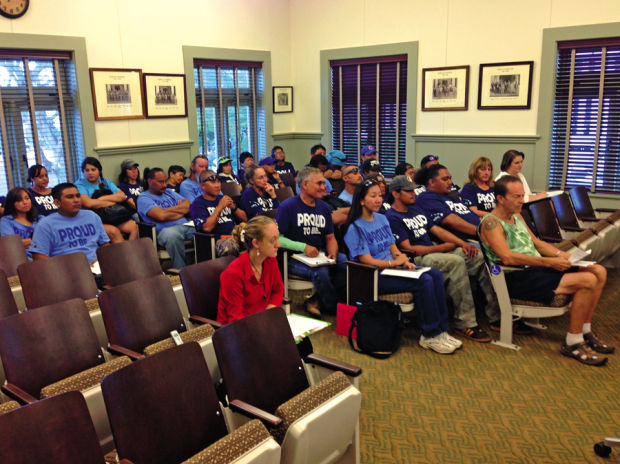LIHUE — The Kauai County Council met with county attorneys Thursday morning behind closed doors to discuss legal aspects of Bill 2491. But only after taking about 30 minutes of public testimony. “You have an opportunity to become icons, heroes,
LIHUE — The Kauai County Council met with county attorneys Thursday morning behind closed doors to discuss legal aspects of Bill 2491. But only after taking about 30 minutes of public testimony.
“You have an opportunity to become icons, heroes, to do what’s right,” said former surgeon and medical professor Larry Schneider, asking for an affirmative vote on the bill. “We’re talking about protecting people.”
The bill requires disclosure of pesticide use and genetically modified organisms, creates 500-foot buffer zones for large ag operations and imposes a temporary halt to the expansion of fields of GMO crops.
A “no vote,” Schneider said, would keep the status quo, while a “yes vote” would allow a pause to make an intelligent pathway to the future, to do what’s right based on additional time to understand the process and have questions answered.
“Only one decision will take care of the land and the future of the people,” he said. “It’s your call, it’s your legacy and it’s your opportunity.”
But to employees of GMO companies, the bill would cause them to lose their jobs, throwing the economy of Kauai’s Westside in shambles.
“The Westside economy would collapse, and the entire island’s economy would be impacted,” said Kekaha resident Kathy Haskins.
She added the unemployment rate on the Westside would increase far above its current 4 percent rate, the real estate market there would be devaluated, and those who would lose their jobs would be forced to sell their homes or go through foreclosure.
Thursday’s meeting attracted more than 30 people wearing blue shirts, all “proud to be” a seed company worker or “Kauai ag.”
By contrast, a single person wore a red shirt, the color adopted by Bill 2491 supporters. Big Island native Jennifer Ruggles, an organizer at Pesticide Action Network, stood out in the crowd, sitting alone among empty rows of chairs, while the other side of the chambers — the only side captured by TV cameras — was filled with blue shirts.
But Ruggles wasn’t without support. Schneider and Wailua resident Rich Hoeppner, though blending with the GMO crowd — they wore blue and green and sat by the blue shirts — gave the last two pieces of testimony to balance the scale against five testimonies opposing the bill.
Hoeppner said he was testifying against the bill as written. What he wanted was additional restrictions to pesticide use. GMOs are not the problem, he said, it’s the pesticide spraying that is polluting the island.
The bill in its current form allows pesticide spraying to continue during the preparation of an environmental impact statement, which could take two to three years, he said.
“If the spraying continues during that time, how many people will be inflicted with cancer in those years?” Hoeppner said. “How many pregnancies will go wrong in those several years? How much more suffering will be experienced as they continue spraying while the EIS is being done?”
He said the bill needs to be amended to stop the spraying immediately upon approval.
Schneider said there is no question of the dangers of pesticides. He said there have been over 13,061 papers analyzing pesticides, and the data is clear that pesticide exposure increases odds for birth defects — with or without drug use — and causes spontaneous abortion.
“That data is real,” he said.
Blue testimony
Haskins said nobody forces farmers to buy GMO seeds, but they choose to do so because the seeds result in greater yields with less pesticide use.
“In other words, they make more money,” she said.
Susan Tai Kaneko said the bill discriminates against four seed companies and Kauai Coffee. Pesticides, she said, are also sprayed on small farms, hotels, county properties, hospitals, schools and other places.
Tai Kaneko said the bill has created division among island residents, and she is really sad with the “lack of aloha” that has resulted.
Eleele resident Mark William also said the bill is discriminating against GMO companies and is dividing “innocent” Hawaiians.
He said he lost faith in the local government.
Tyleen Maderas, wearing a blue shirt, said hopefully the death threats to her friends will stop.
In her opinion, she said, the best way of getting rid of GMOs is to boycott them — including alcohol, ascorbic acid, aspartame, baking powder, salt, citric acid, glucose, fructose and ethanol.
Eleele resident Samuel K. Ku Sr., “born and raised in the cane-field days,” said he has three sons, all healthy.
“It’s our right to eat what we want, you guys cannot tell us no eat ice cream,” he said. “You guys cannot tell me to tell my son, “Oh son, you cannot eat mac and cheese anymore because there is GMO in that product.’”
On Monday, the council’s Economic Development (Agriculture) Committee will meet to discuss Bill 2491 and potentially introduce amendments. The meeting is at the Historic County Building in Lihue, starting at 9 a.m. The public is allowed to testify.
On Sunday, a march in support of the bill will start at 12 p.m. at Vidinha Stadium in Lihue and go all the way to the Historic County Building.


